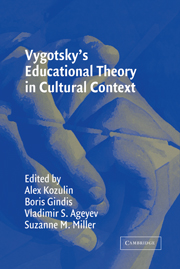Book contents
- Frontmatter
- Contents
- List of Contributors
- Series Foreword
- Introduction: Sociocultural Theory and Education: Students, Teachers, and Knowledge
- PART I CONCEPTS AND PARADIGMS
- PART II DEVELOPMENT AND LEARNING
- PART III SOCIOCULTURAL THEORY APPLICATION IN THE CLASSROOM
- 11 Cultural–Historical Theory and Mathematics Education
- 12 Sociocultural Theory and the Practice of Teaching Historical Concepts
- 13 Formation of Learning Activity and Theoretical Thinking in Science Teaching
- 14 How Literature Discussion Shapes Thinking
- 15 Beyond Cognition
- PART IV DIVERSE LEARNERS AND CONTEXTS OF EDUCATION
- Author Index
- Subject Index
- Titles in the series
- References
13 - Formation of Learning Activity and Theoretical Thinking in Science Teaching
Published online by Cambridge University Press: 05 June 2012
- Frontmatter
- Contents
- List of Contributors
- Series Foreword
- Introduction: Sociocultural Theory and Education: Students, Teachers, and Knowledge
- PART I CONCEPTS AND PARADIGMS
- PART II DEVELOPMENT AND LEARNING
- PART III SOCIOCULTURAL THEORY APPLICATION IN THE CLASSROOM
- 11 Cultural–Historical Theory and Mathematics Education
- 12 Sociocultural Theory and the Practice of Teaching Historical Concepts
- 13 Formation of Learning Activity and Theoretical Thinking in Science Teaching
- 14 How Literature Discussion Shapes Thinking
- 15 Beyond Cognition
- PART IV DIVERSE LEARNERS AND CONTEXTS OF EDUCATION
- Author Index
- Subject Index
- Titles in the series
- References
Summary
PROBLEMS OF SCIENCE CLASSROOMS
One of the main tasks of schools today consists of preparing students for lifelong learning. That means, first of all, enabling students to learn and think independently and efficiently. It is well known that learning tasks and demands in science education present substantial difficulties for the majority of students (Solomon & Aikenhead, 1994; Yager, 1996; Wiser & Amin, 2001; Vosniadou, Ioannides, Dimitrakopovlov, & Papademetriov, 2001; Mikkilä-Erdmann, 2001). International comparisons (e.g., by the Third International Mathematics and Science Study [TIMSS] and the Programme for International Student Assessment [PISA]) have shown large problems concerning application tasks, problem solving, and scientific argumentation, whereas reproductive tasks and skills were better mastered. Science education suffers – among other shortcomings – from the dominant orientation toward isolated, nonsituated facts, which are seldom applied to real-life situations. This approach leads to difficulties in understanding and a loss of sense and motivation in many students.
In this context, many important questions arise, among others: What can teachers do to maximize the effective construction of adequate science knowledge by students? How can teachers maximize the opportunities for students to construct new schemata, new ways of thinking about the world (Adey & Shayer, 1994; Demetriou, Shayer, & Efklides, 1992)? The problem and the questions are not new. And there exist different approaches and answers.
- Type
- Chapter
- Information
- Vygotsky's Educational Theory in Cultural Context , pp. 267 - 288Publisher: Cambridge University PressPrint publication year: 2003
References
- 24
- Cited by



